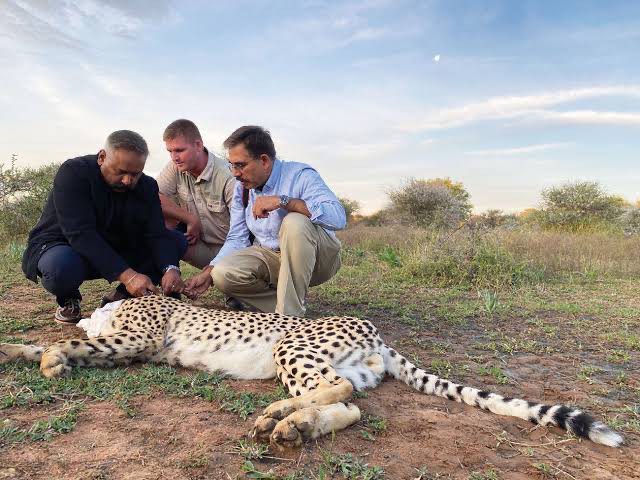Bringing to you the story of a passionate animal enthusiast turned Wildlife professional, The Pioneer interacts with Dr. JV Jhala, a wildlife scientist and conservationist, about his love for these animals.
Rashmi Bhumireddy
Many of us adore animals. While few of us would adopt dogs, cats, or horses, there are certain people whose love for animals leads them down unusual roads. Dr. Yadvendradev Vikramsinh Jhala, also known as Dr JV Jhala, is a wildlife scientist and conservationist whose childhood love of animals inspired him to seek a career in wildlife.
During his college days, there were very few people who pursued about wildlife studies. “With my love for animals,” Dr. JV Jhala continues, I have treated it not only as a hobby but also as a profession. Following my schooling and inter, I went on to study Zoology at the University of Bombay (Bachelor’s and Master’s degrees). I then finished my PhD research at Virginia Polytechnic Institute and State University in the United States.”
In 1991, Dr Jhala obtained a postdoctoral fellowship at the Smithsonian Institution and studied reproductive energetics using doubly labeled water. He joined the Wildlife Institute of India in 1993 and has since pursued an active research programme on Indian carnivores. He also continued to be a research associate of the Smithsonian Institution and a member of the International Union for Conservation of Nature (IUCN) Species Survival Commission (SSC) Specialist Group for Wolves and Canids. Recently, he had ended his tenure as a Dean at the Wildlife Institute of India, in Dehradun.
“I have gotten the opportunity to work in the National Geographic Channel because of my good exposure in abroad,” he stated of his opportunity to work with the National Geographic Channel. “Furthermore, the channel supports research in India. They sponsor many geographical projects in India.”
Sharing his thoughts on the deaths of African cheetahs in the Kuno project, he stated that some of the deaths may have been avoided with competent or good administration and better animal care. Furthermore, some of the causes of death can be avoided.
Dr. Jhala stated that there is no difficulty with India’s climate when it comes to animal adoption, particularly those brought in from other nations. He says, “Within a few years, the animals will adapt to it. When the cheetahs are transported to India from African countries, it is summer in India but winter in the African countries (South Africa and Namibia), therefore the animals have thick winter coats, but by the next year, they will have adapted to the Indian climate. The fundamental cause is photoperiod, or animals’ capacity to detect light during the day and night. They produce hormones in their systems that require time for the animal to adjust to. They will adjust to the climatic conditions of India after a few years.”
Since Indian cheetahs became extinct in 1952, he also highlights, “Our country has decided to adopt cheetahs from other countries, especially African countries. But in my opinion, we should have brought cheetahs from Iran where Asiatic lions live. There are only 15 individuals of them left in Iran.”
In the case of Lions, Dr. Jhala said, “We have started with a small population but today the number of lions has increased to 700. The problem with lions is that we have a single lion population and it needs to be spread out in a larger area. So, we don’t have all the eggs in one basket.”
In regards to tigers, he reveals that India has a good number of tigers and moreover our country exports them to other places or foreign countries.
Speaking about his challenges, Dr Jhala said, “There are no challenges in safari or working as a wildlife scientist. I have worked with various animals, canines, wolves, cats such as lions, tigers, cheetahs, etc. While working in wildlife, you will contribute to global policy and share your education or knowledge in various spheres and in different parts of the world regarding it.” For the unaware, there is also a non-governmental organization called World Wide Fund for Nature, which aims to organize earth series to create awareness and educate the public about the conservation of animals.
Dr. Jhala further encourages youth to pursue a career in wildlife. For this, you have to opt Science stream -Biology, Zoology, Botany, Life sciences, and Veterinary sciences. “In India, we have good master programs that have been offered in alternate years. There are the National Centre for Biological Sciences (NCBS) and Aligarh Muslim University, VV College of Science and Technology in Tamil Nadu. In regards to abroad, countries like the US, the UK, and Germany offer good master and PhD programs to students. People interested in this field should take up a career in wildlife is that you should work hard and study well. Working in wildlife is a lifelong romance with nature and you work for a global purpose to stop extinction and conservation of animals.”
Meanwhile, on an inspiring note, he ends by saying that he is looking forward to spending more time with animals by adopting, playing with dogs, and engaging in horse riding.
Unleashing the wildlife calling




